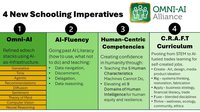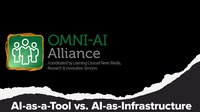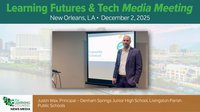As AI continues to grow in acceptance and use in the workplace the need for AI upskilling has become essential for employers who want to leverage the power of these new and exciting tools. However, to unlock the power of AI employers need to think beyond just providing functional training on how to use the tools themselves. AI represents an enormous change in how teams approach and perceive their jobs, so it is essential that organizations embrace both culture building strategies in addition to tactical and functional trainings. Below are four key steps organizations can take to successfully upskill employees in AI while also building a culture of growth and innovation.
- Believe that your existing employees can lean into AI and have the skills and abilities to be upskilled instead of going outside of the organization.
The most recent Career Optimism IndexÒ study found that more than half of workers say knowing how to leverage AI would give them an advantage in their career. Several roles tied to AI (like prompt engineering) do not need long-form credentials like a data-science or programming degree. Taking existing personnel and unlocking their potential through training may be a cleaner and more efficient path that also drives better employee engagement than hiring externally.
- Create an environment that encourages exploration of AI solutions in the workplace.
There is no better teacher than hands-on practice, and hands-on practice that leads to improvement is a powerful agent for change. To upskill workers with AI create organizationally approved initiatives where employees are able to use different AI tools as an opportunity to potentially solve organizational problems. This approach has a myriad of benefits from learning more about AI models, improving the skills of users, limiting risk from employees using unsupported tools, and improving organizational processes with outcomes of the AI experimentation.
- Come up with an organizational philosophy on AI.
Upskilling employees requires a clear path and direction on what is necessary to learn and apply for the improvement of an organization. AI and its uses, models, applications, and designs are vast and varied. An organization that has not taken the time to create a philosophy, determine ethical use, and identify goals will have a hard time directing employees to the right trainings or programs to get involved in to properly upskill, so focusing on this will create clear pathways of development that benefit both the employee and the organization.
- Implement mentorship and community of practice opportunities.
Formal training programs are an excellent starting point for those getting into the field of AI, but internal programs or communities can unlock further potential in upskilling staff members and improving their ability to interact and engage with different models or tools. Whether it is more personal like 1:1 mentoring or larger community of practice groups, providing formal programs for your organization to engage in and discover how to better leverage and apply AI can act as a fertile ground to support employee upskilling on a practical level.
For all of the promise AI offers humanity, it is important that we do not forget the human element required to unlock AI’s potential. Adoption of any new tool or way of doing business requires we assess the landscape from multiple perspectives, and using the power of people to increase adoption as an avenue to support upskilling is a perspective that should be embraced. This small, but significant, nuance may be the thin line that makes the difference between organizations that are powered by AI versus those that are more productive because of AI.
About the Author:
Marc Booker, Ph.D. is Vice Provost, Strategy at University of Phoenix. With over two decades of experience working with online and distance education students at the post-secondary level in admissions, registrar and academic administration roles, Dr. Marc Booker brings a unique perspective on the trends in higher education from a post-traditional student lens.
As Vice Provost for Strategy at University of Phoenix, Booker oversees critical path academic initiatives to enhance the student experience such as learning platform implementations, curricular enhancements, developing innovative academic program designs and creating empathetic solutions to drive better student outcomes through technology or through continuous and relentless improvements.











